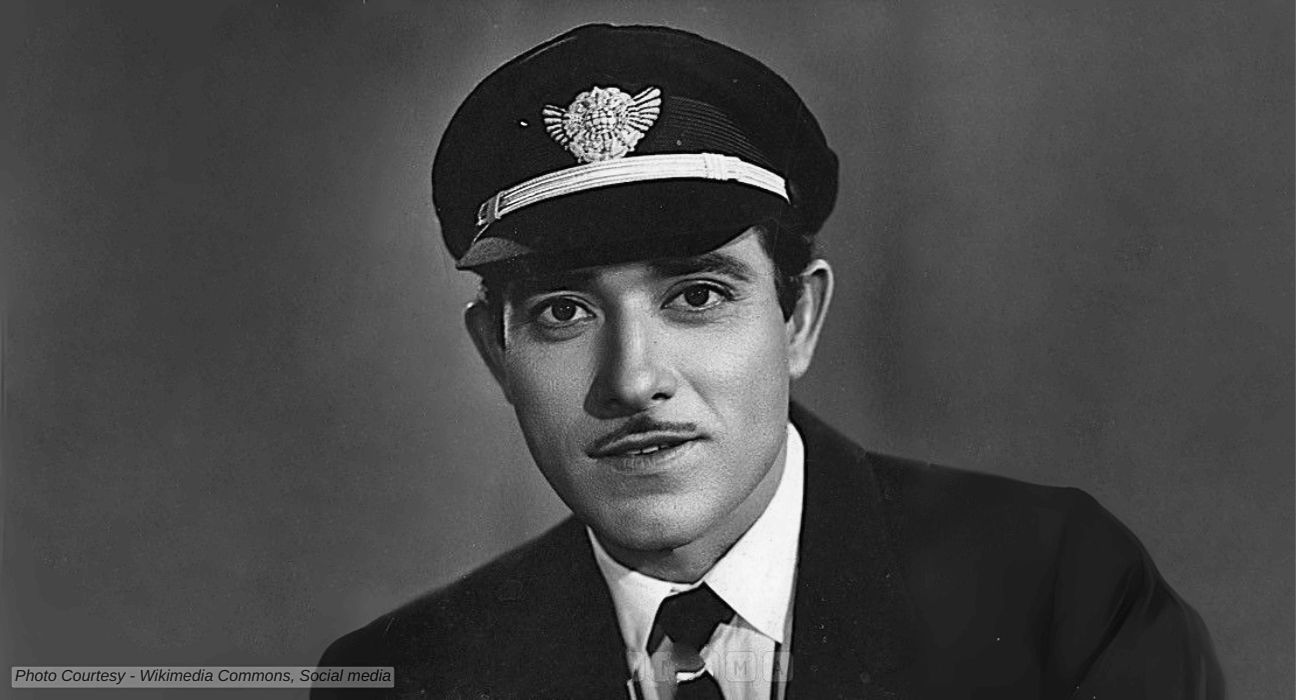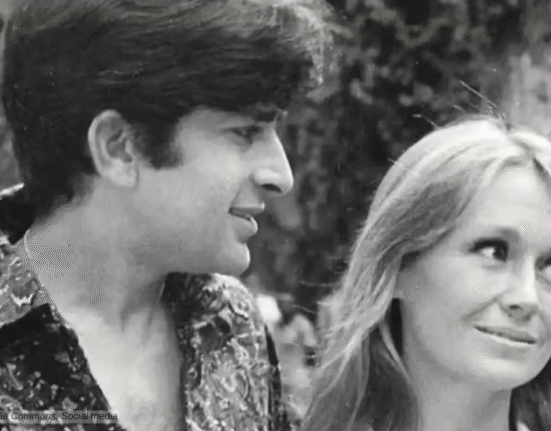Raaj Kumar, known for his charismatic voice, commanding screen presence, and brooding personality, was an enigma. There are plenty of stories of his arrogance and high-handed nature in popular culture, but when you listen to people who know him, they will tell you the completely different side, which is that of a thorough gentleman, a considerate and compassionate man with his heart in the right place. The story tells us that behind his tough exterior was a mellow family man who, despite his monumental success, remained grounded.
Early Life and Career
Raaj Kumar was born Kulbhushan Pandit on October 8, 1926, in Loralai, Beluchistan, now in Pakistan, into a Kashmiri family. He moved to Bombay in the 1940s and joined the police force as a subinspector.
His film debut came in 1952 with Najam Naqvi’s “Rangeeli,” opposite Rehana. He went on to star in films like Amar Dutt’s “Anmol Sahara (1952),” Hasrat Lucknowi’s “Aabshar (1953),” Dharam Kumar’s “Ghamand (1955),” and Hira Singh’s “Lakhon Mein Ek (1955).”

His breakthrough role came with the Sohrab Modi‘ss epic Nausherwan-e-Adil (1957), where he played the role of Prince Naushazad opposite Mala Sinha.
the same year he was cast by Mehboob Khan in one of Indian cinema’s greatest films, Mother India (1957). In the film he played the role of Nargis‘s husband Shyamu. He was widely praised for his role as the poor farmer who lost his hand in a freak accident, couldn’t cope with the tragedy, and left home. The film went on to be nominated for an Academy Award, establish Raaj Kumar as a star, and set the stage for a series of successes.
Raaj Kumar – The Superstar
In 1959, he starred in S. S. Vasan’s “Paigham” with Dilip Kumar. His portrayal of a caring elder brother earned him widespread acclaim. The film earned him his first Filmfare Award for Best Supporting Actor nomination. In 1960, he starred opposite Meena Kumari in Kishore Sahu’s “Dil Apna Aur Preet Parai.” The romantic drama known for the chemistry between Meena Kumari and Raaj Kumar was a big critical and commercial success.
In 1963, he again paired with Meena Kumari in the musical love triangle “Dil Ek Mandir,” a story of love, sacrifice, and the complexities of human relationships. The film’s biggest usp is, its intense performances and soulful music. He won the Filmfare Award for Best Supporting Actor for his performance as a man suffering from last-stage cancer. The same year, he played Hariya in Trilok Jetley’s “Godan,” an adaptation of Munshi Premchand’s novel.


In 1965, he starred in Yash Chopra’s multi-starrer “Waqt,” with Sunil Dutt, Balraj Sahni, Sadhana, Shashi Kapoor, and Rehman. The film has one of Indian cinema’s most famous dialogues, “Chinoy Seth, Jinke apne ghar sheeshe ke hon, woh dusron par pathar nahi phenka karte.” The film earned him another Filmfare Award for Best Supporting Actor for his standout performance as the suave and sophisticated thief Raja.
Critical Acclaim
One of his other outstanding performances came in “Kaajal (1965),” opposite Meena Kumari, where his performance of a man with grey shades earned him the Filmfare Award for Best Actor Nomination. In the 1968 film “Neel Kamal,” Raaj Kumar played the role of Chitrasen, a sculptor. Chitrasen fall in love with a princess played by Waheeda Rahman and is condemned to a brutal death for that. Raaj Kumar’s performance earned him another Filmfare Award for Best Supporting Actor nomination.
One other notable film of his career was Chetan Anand‘s “Heer Raanjha (1970),” based on the legendary Punjabi folklore. He portraed the doomed lover, Ranjha, with great conviction and emotional availabilty. He captured the essence of a lover’s despair and passion.
Although Pakeezah (1972) is primarily remembered for Meena Kumari’s last performance. But Raaj Kumar’s role as Salim Ahmed Khan, the love interest of Sahibjan, was also memorable. His evergreen dialogue, “Aapke paon dekhe, bahut haseen hain. Inhe zameen par mat utariyega, maile ho jayenge.” This dialogue served as the film’s focal point and comes again and again as a reminder of the absurd and tragic lives of Tawayafs.
Some of his other notable films include Dulhan (1958), Panchayat (1958), Ardhangini (1959), Ujala (1960), Gharana (1961), Phool Bane Angaare (1963), Zindagi (1964), Oonche Log (1965), Hamraaz (1967), Mere Huzoor (19658), Vaasna (1968), Lal Patthar (1971), Hindustan Ki Kasam (1973), 36 Ghante (1974), and many more.
The Raaj Kumar Of 80s-90s
From the mid-70s on, Raaj Kumar transitioned into the character roles, but with a twist: they were always strong, larger than life, righteous characters. Some of his notable films in this era include Karmayogi (1978), Chambal Ki Kasam (1980), Bulundi (1981), Kudrat (1981), Dharam Kanta (1982), Raaj Tilak (1984), Marte Dam Tak (1987), Mahaveera (1988), Desh Ke Dushman (1989), Jungbaaz (1989), Galiyon Ka Badshah (1989), Suryaa: An Awakening (1989), Police Public (1990), Police Aur Mujrim (1992), Tirangaa (1993), Betaaj Badshah (1994), Jawab (1995), God and Gun (1995), among others.
In 1991, Subhash Ghai managed to convince Raaj Kumar and Dilip Kumar to star in his epic “Saudagar.” The film became a cult classic, mainly because of the never-before-seen chemistry between two thespians.
His dialogue, “Jaani, hum tumhe maarenge, aur zaroor maarenge, lekin woh bandook bhi hamari hogi, goli bhi hamari hogi, aur waqt bhi hamara hoga,” is still fresh in the memories of film lovers.

Personal Life
Raaj Kumar married Jennifer, an Anglo-Indian air hostess who later changed her name to Gayatri Kumar. They had three children: Puru Raaj Kumar, Panini Raaj Kumar, and Vastavikta Pandit.
Raaj Kumar passed away on July 3, 1996. He had Hodgkin lymphoma, a type of cancer that develops in the lymph system.
Raaj Kumar is often remembered for his powerful and impactful dialogues, which have become synonymous with his legacy in Indian cinema. His unique style, often imitated but never duplicated, had a theatrical quality that made even the simplest of lines memorable. His ability to convey depth, emotion, and a larger-than-life persona through his dialogues has made him an icon of Indian cinema.
Raaj Kumar on IMDB













Leave feedback about this